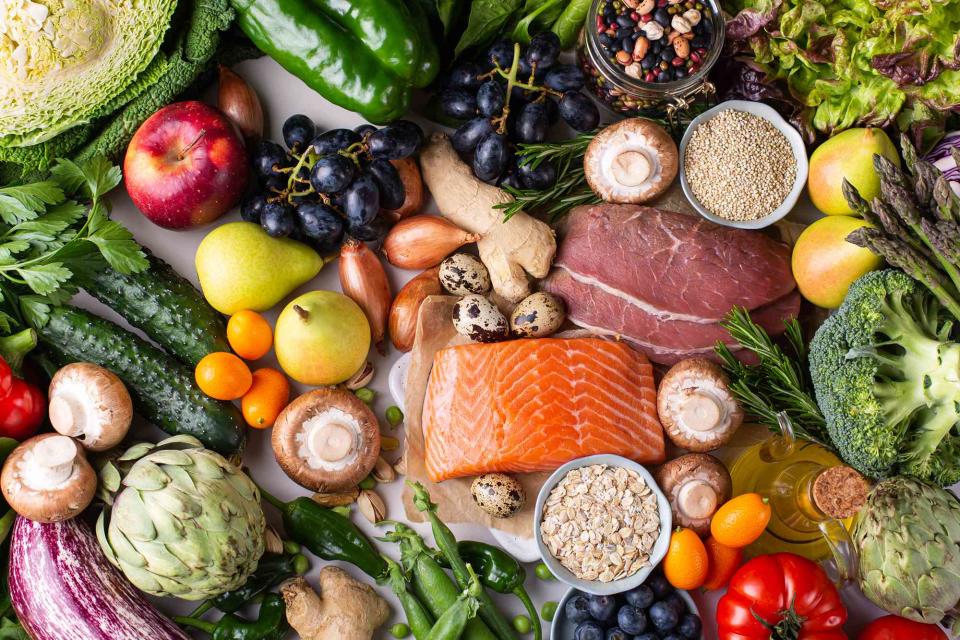Why Mediterranean Cuisine Is More Than Just a Diet — And Why People Love It
U.S. News and World Report just named the Mediterranean diet the ‘Best Diet of 2023.’ What does that actually mean?

Getty Images
It’s a new year, which means it’s time for all-new “best of” lists. Straight out of the gate, U.S. News and World Report is back with its list of best diets, and for the sixth straight year, the Mediterranean diet has come out on top. But, there’s more to this cuisine than what you eat.
To come to its conclusion, U.S. News and World Report editors dug deep into medical journals and government reports to create what it calls “in-depth profiles” of potential choices. It then asked a panel of nationally recognized experts (including medical doctors, nutritionists, and nutritional epidemiologists) to answer a 40-question survey around each diet, which included questions like, “Are all food groups included in the diet,” and, “Can the diet be modified to meet cultural, religious, and other personal preferences?” Then, it asked 33 more experts in nutrition, food psychology, and chronic disease management to scrutinize its profiles before publication.
“[A]ccording to years of research and evidence, primarily eating plant-based foods, such as fruits and vegetables, while incorporating whole grains, beans, nuts, seafood, lean poultry, and unsaturated fat from extra-virgin olive oil is incredibly good for overall well-being,” U.S. News and World Report explained about its decision to name the Mediterranean diet number one once again. However, it noted an important caveat worth exploring — that the Mediterranean “diet” isn’t just a way of eating, but a way of life for many around the world.
“People from many different cultures worldwide already embrace this way of eating. They simply use different varieties of produce, seafood, herbs, and spices. After all, what matters is that plenty of nutrient-rich foods are being consumed regularly. The Mediterranean diet focuses on quality rather than a single nutrient or food group,” the editorial team added.
The term “the Mediterranean diet” was popularized globally by Ancel Keys, an American scientist from the University of Minnesota School of Power. As The New York Times explained in Keys’ 2004 obituary, in the 1950s, Keys spent time in small towns across Southern Italy, where he observed a population of people he deemed healthier than their New York counterparts. Keys suggested in his research that this was due to their food choices, which he further validated in the famed “Seven Countries Study,” which showed that those who followed the food choices had both lower blood pressure and lower risk of cardiovascular disease.
However, the name can trip many people up, because both the history and worldwide reach of this way of eating stretches past the Mediterranean region.
As professor Tina Moffat, a nutritional anthropologist, and professor Shanti Morell-Hart, a fellow anthropologist, shared in a 2020 piece published in The Conversation, “Defining a single Mediterranean diet is tricky business. The Mediterranean region encompasses hundreds of languages and cultures, culinary techniques, and styles.” The professors noted that “the ancient past was equally diverse, with millennia of migration and trade across the region bringing new ingredients and culinary innovations. Ask someone in Lebanon if their food is the same as Spain’s, or someone in Morocco if their food traditions are identical to those in Greece.”
The duo additionally noted that any global survey of the core principles of the Mediterranean diet — which Harvard Health says includes “an abundance of plant foods, including fruits, vegetables, whole grains, nuts, and legumes, which are minimally processed, seasonally fresh, and grown locally” — can be found in both the food traditions and cuisines of most cultures around the world. They specifically shouted out Mexico’s cuisine as a prime example, noting that “the combination of corn tortillas and beans — accompanied by foods like squash and tomato salsas — has yielded complete plant-based proteins that provide a nutritious and sustainable diet,” and “[r]esearch on soy-derived and fermented foods found in traditional Chinese cuisines shows they are high in bioactive peptides that can provide protection against disease.”
And there’s one more important item noted by UNESCO, which added the Mediterranean diet to its list of the Intangible Cultural Heritage of Humanity in 2013: The “diet” isn’t only about food — it’s also about community.
“Eating together is the foundation of the cultural identity and continuity of communities throughout the Mediterranean basin. It is a moment of social exchange and communication, an affirmation and renewal of family, group, or community identity. The Mediterranean diet emphasizes values of hospitality, neighborliness, intercultural dialogue and creativity, and a way of life guided by respect for diversity. It plays a vital role in cultural spaces, festivals and celebrations, bringing together people of all ages, conditions, and social classes.”
“Sitting down meals, thinking about what you're putting in your mouth, spending time cooking,” are all key tenets of this way of living, Moffat shared with Food + Wine, “and that's really not specific to the Mediterranean diet.” Don’t worry. She added that none of this means you “have to be a gourmet cook” either.
So while the 21 nations surrounding the azure waters of the Mediterranean (which includes nations in Europe, Africa, and Asia) tend to get the credit, it’s important to remember this way of living is both by and for everyone. And you can start just by sitting down for a meal with those you love.

